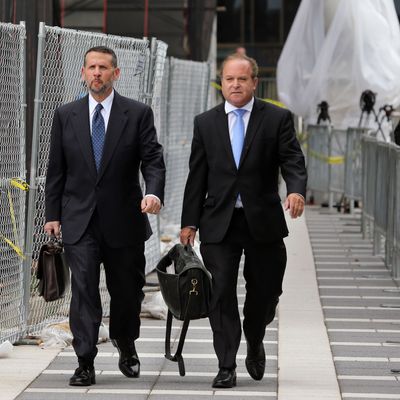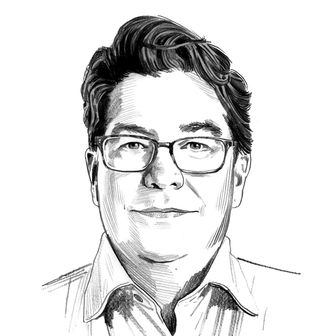
On Monday, David Wildstein — the key witness in the federal criminal case that has waylaid the career of his former boss, Governor Chris Christie — recounted a 30-year history as a political dirty trickster. “I liked people to think that I played hardball,” the former political operative and anonymous blogger told a packed courtroom in Newark. “I liked them to think that I was aggressive, and went to extremes to win an election.”
Wildstein described a litany of capers that he liked to boast about: swiping a coat from a Democratic senate candidate to make him appear less dignified during a debate; stealing all the copies of a local newspaper when it failed to endorse his own campaign for mayor of the town of Livingston; sabotaging the electoral slate of a political enemy; arranging a free bus trip to take Democratic voters to Atlantic City for Election Day. (Some of these stories of deception, Wildstein admitted under questioning from prosecutors, were themselves lies that he told to make him appear more Machiavellian than he really was.) His aptitude for creative political tactics eventually led him to the Port Authority, where he worked as an agent — what is known within the agency as a “hammer” — for Governor Christie. And it was in that job, Wildstein testified, that in 2013 he came up with his most ambitious — and ultimately disastrous — scheme of all.
Over several hours of painstakingly detailed testimony, Wildstein described how he came up with and implemented the closure of several traffic lanes that gave access to the George Washington Bridge, from the adjoining town, for Fort Lee, in order to seek revenge against its Democratic mayor, Mark Sokolich. Repeatedly, he said that that lanes were closed “for the purpose of punishing Mayor Sokolich, because he had not endorsed Governor Christie,” who was then running for reelection, and seeking Democratic support. Though he admitted coming up with the idea, he said that it was enthusiastically approved by the defendants in the case — his boss at the Port Authority, Bill Baroni, and a deputy chief of staff to Christie, Bridget Kelly — and also said that a top political aide to the governor, Bill Stepien, was deeply involved. (Stepien, who was not indicted, is now the national field director for the Donald Trump campaign.) He described observing the Fort Lee access lanes during a 2011 tour of the bridge, and said he advised Baroni and Stepien that they could be used as “a potential leverage point” against Sokolich.
“My relationship with Mr. Stepien,” Wildstein explained, “was that he expected me to give him information that might help him to secure endorsements.”
At the time, though, Sokolich was considered friendly to Christie — so much so that he was singled out for special treatment. Wildstein described giving Sokolich a tour of the World Trade Center construction site, and relaying the message that the mayor had called Christie “a great governor and I don’t mind saying it.” Stepien replied via email: “It’s good to be an incumbent with stuff to offer, ain’t it?” However, when Stepien forwarded Wildstein a list of Democratic endorsement targets, listing Sokolich as a “no go,” Wildstein said be began thinking about how the Port Authority could use its leverage.
By this time, Stepien had left the state government to work at Christie’s campaign manager, handing over his previous position to Kelly. After Sokolich rejected Christie, prosecutors showed, Kelly stalled a program that used Port Authority funds to subsidize snow removal in Fort Lee. “At that time,” Wildstein said, “I understood that Mayor Sokolich was no longer on the favored mayor list.” Apparently Sokolich didn’t get the message, however, because later that summer Kelly and Wildstein allegedly began discussing a plan to close the traffic lanes. On August 12, Wildstein wrote to Kelly: “I have an issue to discuss with you, extraordinarily weird even by my standards.” Wildstein testified that he didn’t know which “weird” idea he was referring to. But the next morning, Kelly wrote him a fateful note: “Time for some traffic problems in Fort Lee.”
Wildstein testified that he immediately informed Baroni. “Mr. Baroni was a little surprised that it was coming this late” in the election season, Wildstein said, but he alleged that they nonetheless pushed forward with planning. Wildstein testified that he suggested staging the closures during the last week in August, but he said Baroni countered that traffic might be light on those days. To maximize the mayor’s pain, Baroni allegedly came up with another suggestion. “Mr. Baroni asked me, ‘When is the first day of school?’” Wildstein recounted. He came up with the date September 9.
“He smiled and said ‘Fantastic,’” Wildstein said. Throughout the case, Baroni has claimed that he was aware of the closures, but thought they were part of a legitimate study of traffic patterns Wildstein was pursuing. The prosecution presented evidence to undermine that claim today by showing that previous actions had been conducted after gathering community input — in one instance, Baroni himself knocked on doors in the town of Weehawken to inform residents of construction work scheduled for the Lincoln Tunnel approach. Wildstein testified that Baroni was pleased when his aide informed him that the location of Sokolich’s residence meant that “if he was leaving his house that morning, he would probably hit that traffic.”
Wildstein testified that he also briefed Stepien, the campaign manager. “Mr. Stepien asked about what story we were going to use,” he said. “I explained to Mr. Stepien that I was going to create the cover of a traffic study.” (Stepien also told him that any further discussion should be routed through Kelly.) In the days leading up to the closures, Wildstein met yet another Christie supporter, Port Authority board member Pat Schuber, at a New Jersey diner, to brief him on the coming action. Schuber was formerly the top elected official in Bergen County, which Fort Lee is a part of, and would have been well aware of the traffic consequences of closing the lanes. Wildstein said he told the board member that “there was going to [be] a lot of traffic in Fort Lee, and it came from the governor’s office because of Mayor Sokolich.” He explained that he did so because he “viewed Mr. Schuber as a loyal member of Governor Christie’s team.”
(Schuber is still on the Port Authority board. After the court session, New Jersey Senate Majority Leader Loretta Weinberg, a Democrat who has been regularly attending the proceedings, called for his resignation.)
Near the close of his testimony, Wildstein described watching the implementation of the lane closures from a control center adjacent to the bridge. “I knew that the plan that I had set into motion was working,” he said. “That there was a lot of traffic.” After a friendly Port Authority police officer took him for a tour of the clogged streets, he said he drove from an Authority parking garage directly onto the bridge. As he headed toward his office in Manhattan, he said, he called Baroni and Kelly to report the results of his plan.
“I told [Kelly] that the traffic was an absolute mess,” Wildstein said.
“How did she respond?” asked prosecutor Lee M. Cortes Jr.
“She was pleased,” Wildstein said.






























